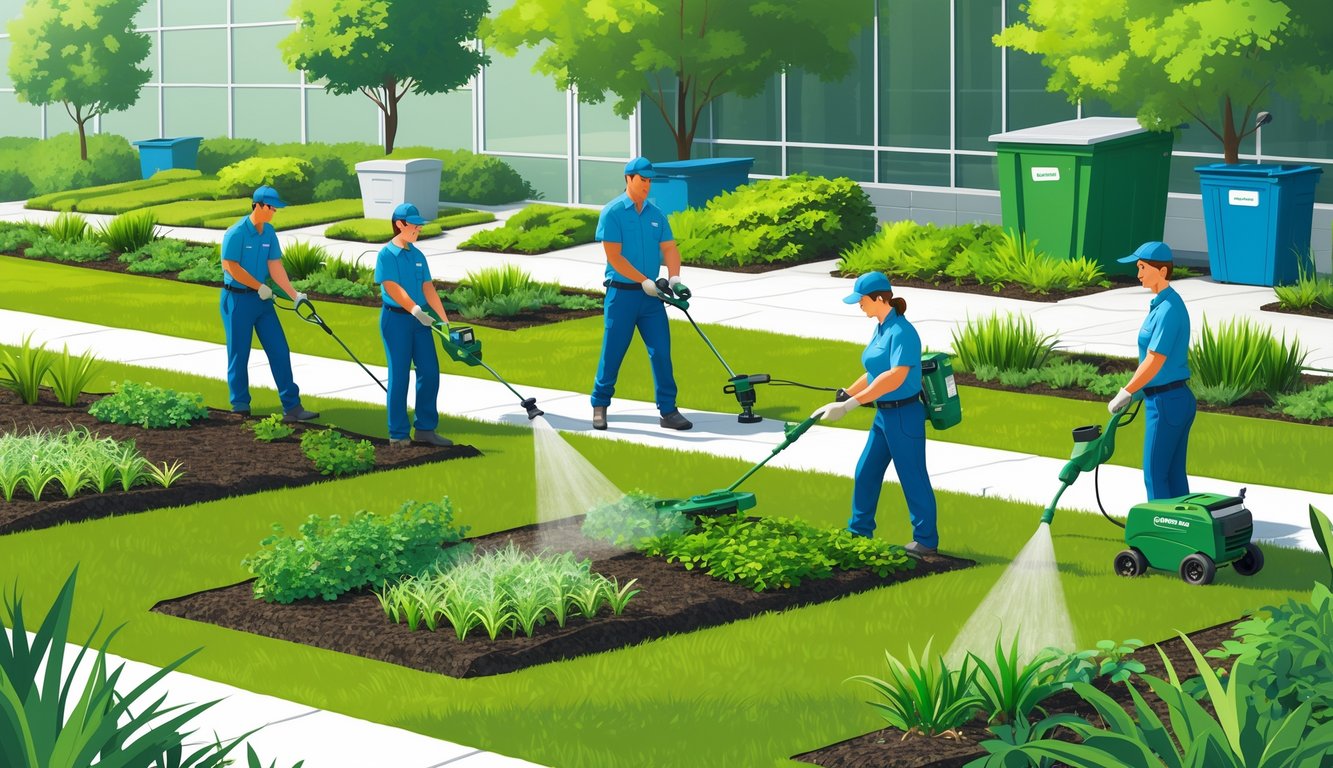
Implementing Integrated Weed Management for Professional Results
Nobody said I’d go through this many gloves trying to do “professional” lawn care. Integrated weed management? Basically, throw every method at the problem and hope some combo works. Chemical, cultural, mechanical, biological—plus spreadsheets and a lot of swearing. Consistency beats charm, and honestly, the best groundskeeper I know doesn’t even own a leaf blower.
Combining Multiple Control Tactics
Every groundskeeper has a “secret” cultural practice—crop rotation, overseeding, whatever. Sometimes it works, sometimes you just make a mess. Mixing methods is the only way: preemergent herbicides early, mow at the right height (Illinois Extension agent once told me “low cuts invite crabgrass”), mulch bare spots, overseed with tall fescue (but then the mower clogs and your Saturday’s shot).
Go all-in on glyphosate? Bad idea. The field will mock you—herbicide resistance creeps in, and suddenly ragweed is immortal. It’s not about being “organic”—it’s just about what actually works. So, yeah, I’ve thrown nematodes, fungi, mealy bug traps, and timed sprays at the problem. Sometimes the lawn smells like a science project after rain, but hey, at least it’s not boring.
Monitoring and Improving Weed Control Programs
Last week I scribbled out five columns—“weeds by tree circle”—in my notebook and, yeah, still somehow forgot where clover outpaced dandelion. Record-keeping: who actually enjoys it? I don’t. But, honestly, it’s better than winging it. I once watched a guy bet his entire golf course’s reputation on his memory. Spoiler: total disaster. Digital mapping apps? They log weed hotspots. That’s actually handy when you’re trying to figure out if you’ve made any progress year-over-year. Supposedly, if you tweak your tactics every month, you can cut weed density by like 20% in a season. At least that’s what Washington State University claims. Feels optimistic, but maybe they’re right.
Experts love to roll their eyes at anyone who sticks with the same two pre-emergents for years. If you do that, I swear your plots will just explode with resistant wild oats. I try to adapt—weekly visual scouting, then maybe swapping in a rotary hoe or testing a lower herbicide rate after a good overseed. It’s just…less chaos, I guess. One IWM consultant told me, dead serious, that if you’re not checking spray effectiveness or watching crop canopy closure, you’re basically just mowing in circles. Sometimes you really are.
Frequently Asked Questions
Every time I flip through field notes, something weird pops up. Like, now people are using robots to yank weeds, and I’m supposed to act like that’s normal? EPA reports say over 40% of pros swapped at least two old methods for new ones this year, but nobody wants to admit which classics stopped working. Is everyone just faking it?
What are the new eco-friendly ways to manage weeds in large areas?
Picture me crouched next to wild violets, mumbling about vinegar sprays. Every third neighbor says mulching is useless, but they do it anyway. I keep seeing organic mulches and flame weeding in contracts—somebody’s cousin swears it’s all about less chemical run-off, less herbicide resistance. Preemergent corn gluten is supposedly the latest thing, but nobody ever talks about the geese. Why is it always geese?
Can you describe some innovative tools that have recently been adopted for efficient weed control?
Laser weeders? AI robots? GPS tarps? Feels like science fiction. But then I see a crew cruising by on an electric cart with a pneumatic hoe and, okay, maybe it’s real. Battery-powered string trimmers with “digital torque management” (whatever that means) just confuse the new guys. Manufacturers swear it’s 20% faster—supposedly. Trade guides back them up, but I have my doubts.
How have professional groundskeepers improved their techniques for weed management?
Sometimes I think it’s just about swapping brands, but then Jim starts quoting some horticulturalist about changing mowing heights every week to mess with weed cycles. There’s always one guy who’s late because he insists on spraying at dawn for “dew-phase absorption”—experts say that makes post-emergents sixty percent more effective, but honestly, I’ve never seen solid numbers. Double passes with rotary scissors? Don’t expect thanks. Half the crew thinks it’s pointless, the rest just want straighter lines.
What updated practices are being used to ensure long-term weed prevention in landscapes?
Anyone who claims landscape fabric solves everything has clearly never battled knotweed—it just punches through like it owns the place. My supplier keeps pushing living groundcovers and overseeding—“competitive planting” is the buzzword, but half the time it means I’m just reseeding clover instead of fixing a broken sprinkler. Compost teas and slow-release mulches? Sometimes they double up, sometimes everyone forgets where the soil thermometer went.
Are there any advanced organic options for professional weed control now available?
Organic suppressants—like iron-based chelates—just sit on the shelf next to citric-acid sprays that smell like lemon candy but permanently stain my boots. I saw a golf-course manager go all-in on vinegar concentrate, only for the wind to whip it everywhere. EPA reps get weirdly vague about run-off, which is…reassuring? Amino acid herbicides are apparently in field trials, so someone out there is getting paid to see if dandelions can get tipsy. Good for them, I guess.
What cost-effective methods have groundskeepers started using to keep weed growth in check?
So, apparently, “nobody pulls weeds by hand anymore”—which is hilarious, because yesterday I watched a supervisor toss out these weirdly fancy ergonomic knives and microfiber knee pads to the crew. Guess what? Labor’s still cheaper than drones, at least around here, unless you live in some weird tech utopia. Mulch from local arborists? Sure, it’s “free,” unless you count the part where you’re picking out someone’s Skittles wrappers for an hour. And then there’s the off-the-books stuff—should I say this? Whatever, people are dumping acetic acid on creeping Charlie and acting like the savings are worth the risk of getting yelled at by some inspector. Is that even legal? Who knows, nobody cares when mowing hacks mean less work for everyone.